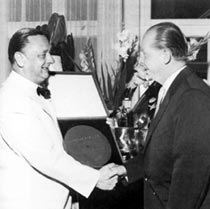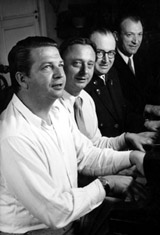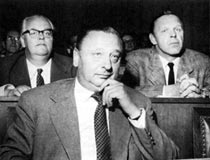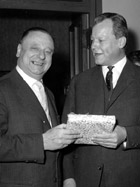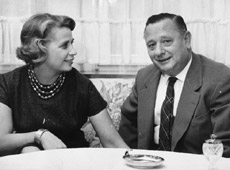
Stephan Pflicht:
The Gerhard-Winkler-Chronicle 1956 Gerhard Winkler buys a villa in Berlin-Grunewald, Lassenstr. 4, built around the turn of the century by the architect Alfred Messel, well-known for example for the architecture of the Berlin department store Wertheim, for the Wertheim dynasty. In May the family moves back to Berlin from Neuhaus am Schliersee. On 24th May Gerhard Winkler establishes the Transeuropa Bühnen- und Musikverlag (Transeurope stage and musik publishers), which is taken over by Richard Birnbach Musikverlag in 1971. In this year Gerhard Winkler writes the music for 4 films: for »Schwarzwaldmelodie«
produced by Geza von Bolvary with the songs Abschiedsmelodie
(Schwarzwaldmelodie), Dort
wo die grünen Tannen stehn for »Die Rosel vom
Schwarzwald« by Rudolf Schündler with the songs Broadway-Melodie
for »Die Stimme der
Sehnsucht« with Rudolf Schock, produced by Thomas Engel, with the songs
Der
Liebe Freud und Leid (Liebeslied)
as well as for »Die
schöne Meisterin«, a singing film produced by Rudolf Schündler with
the songs Alle Verliebten
singen, Auch der allerschönste Sommer geht zu Ende, Bier-Walzer
On 12th September Gerhard Winkler celebrates his 50th birthday, enjoying great public interest. At this time he is at the height of his popularity. Numerous radio stations and newspaper articles value his compositions highly. On this occasion he is paid the special honour of being awarded a golden disc as recognition of the great success of his records on Polydor, which include the Capri-Fischer.
On 29th September Gerhard Winkler becomes active member of the GEMA valuation committee and remains in this position. Gerhard Winkler's new songs
Wo,
wo, wo liegt Dixieland Mütterlein reaches No.18 on the 1956 hitparade with a new German text and title Glaube mir. The following compositions appear in print:
1957 Gerhard Winkler's operetta »Die ideale Geliebte« is first performed on 2nd March in Nuremburg on the Städtische Bühnen. It is then put on stage in many German theatres and produced by numerous broadcasting stations. In 1958 a single edition of the stage production appears in print including the songs: Pelagua, Ich bin ein Reisender, Caramba, Wir träumen bei singenden Geigen, O Monsieur, Eine Nacht so wie heut, Das Militär, das Militär, Ay, ay, ay, die Sonne brennt sehr (Baumwollpflücker-Lied) and Bella, bella Signorina. On 3rd April Gerhard Winkler becomes full member of the GEMA valuation committee and remains in this position until 1964. In June/July Traudl and Gerhard Winkler go on a sea trip from Hamburg to the North Cape. On 3rd September Gerhard Winkler is awarded the Paul-Lincke ring in the spa town of Hahnnenklee in the Harz. After Friedrich Schröder he is the second composer to be honoured with this award.
Als To express his gratitude
for this honour and in remembrance of his visit to Hahnenklee in the Harz Gerhard
Winkler composes Kleine
Harzer Suite with the movements Rosenhochzeit
in Hahnenklee and Hexentanz
auf dem Bocksberg On 3rd October Gerhard Winkler becomes active member of the GEMA board of directors and maintains this position until 1963. The following compositions also appear in print:
1958
Gerhard Winkler writes Ein
armer Musikant In February Traudl and Gerhard Winkler go on a cruise to West Africa. The composer sells his house in Schliersee, the so-caller "Winkler-Alm" and chooses Berlin as his place of permanent residence. The following compositions also appear in print:
1959 From the end of April to the beginning of June Traudl and Gerhard Winkler go on a banana-boat trip to Ecuador. Gerhard Winkler spends the summer holidays with his family on the Ligurian Riviera, where he works on his new operetta »Der Fürst von Monterosso«. An air trip takes Traudl and Gerhard Winkler to the Caribbean and the USA from October to November. 1960 On 19th February Winkler's operetta »Der Fürst von Monterosso« is first performed at the Städtische Bühnen in Augsburg. It is later performed on many German stages. Gerhard Winkler himself conducts the overture to the performance in Augsburg as well as to many of the premières in other theatres, which he generally liked to do when his stage works were performed. The overture to »Der
Fürst von Monterosso« appears in print as a single edition together
with the song Ballett
im alten Stil: (1)
Gavotte a la Rameau Traudl and Gerhard Winkler go on a journey to East Asia during March and April, travelling to India, Hong Kong, Singapore and Japan. The première of Richard Bush's comedy »Drei Mädchen im Bikini (Liebes-Toto)« at the Theater an der Lutherstraße in Berlin is on 9th June, with music by Gerhard Winkler. It is described as a jolly musical and is a flop. The following compositions also appear in print::
1961-62
Following the suggestion of Franz Josef Strauß, federal minister
of defence, Gerhard Winkler composes the Starfighter-Marsch
Gerhard Winkler acquires a summer property in Campione, Tessin, which he discards, however, after three months in order to buy a summer house in Morcote on Lake Lugano. On the occasion of Hans Carste, composer and conductor, being awarded the Paul-Lincke ring on 2nd September 1961, Gerhard Winkler travels to Hahnenklee. This visit to Hahnenklee in 1959 on the occasion of being awarded the Paul-Lincke ring himself, inspired Gerhard Winkler to write Kleine Harzer Suite, which now appears in print. The following compositions also appear in print:
1963 Gerhard Winkler composes the music for the CCC Television GmbH films »Casanova wider Willen«, »Liebeshändel in Chiozza« und »Jenny und der Herr im Frack«. Gerhard Winkler writes
the song Caroline
The following compositions also appear in print:
On 12th December Gerhard Winkler becomes member of the GEMA board of directors and retains this office until 1967. The following composition also appear in print:
1965 In January Traudl and Gerhard Winkler go on a cruise to the Caribbean and then continue to visit friends in New York. Schenk
mir ein Bild von dir Print editions also appear
of the composition Das
Gästebuch sung by Sascha Distel, two concert pieces under the
title Träumendes
Fischerdorf 1966 On 11th February Gerhard Winkler becomes member of the GEMA tariff committee and stays in office until 1967. Gerhard Winkler takes part at the CISAC Convention from 13th to 18th June as GEMA representative. In the summer Traudl and Gerhard Winkler travel to Norway and Sweden, where the composer conducts the radio orchestra in Stockholm. On 12th September Gerhard Winkler celebrates his 60th birthday in Berlin.
In honour of this anniversary Ariola-Eurodisc produces the LP »Gerhard Winkler Welterfolge« with Kammersängerin Erika Köth and Kammersänger Rudolf Schock as well as the Berliner Symphoniker cunducted by the composer himself. On 25th December the first program of German television broadcasts the show »Gerhard Winkler gibt sich die Ehre«, produced in October and directed by Fred Kraus in Munich. Appearing in the show are Margrit Schramm, Peter Minich, Guggi Löwinger, Peter Kraus, Claudio Nicolai and also Gerhard Winkler. Using his successful compositions Neapolitanisches Ständchen and 0 mia bella Napoli (Straßensänger von Neapel) Gerhard Winkler composes an orchestra suite in three movements with the title Ein Tag in Neapel. The new second movement has the title Napoli bei Nacht. The following compositions also appear in print:
1967 Together with friends from the Berlin tennis club »Zehlendorfer Wespen« Traudl and Gerhard Winkler go on a trip to South America from 6th to 31st March, which takes them to Rio de Janeiro, Sao Paulo, Montevideo, Punta del Este, Buenos Aires, Santiago de chile and Valparaiso. In May Gerhard Winkler spends four weeks in the health resort of Bad Mergentheim. Afterwards Traudl and Gerhard Winkler go on a trip to Norway. On 22nd June Gerhard Winkler becomes active member of the GEMA board of directors and stays in this office until 1971. At the same time he belongs to the GEMA program committee and also stays in this office until 1971. Gerhard Winkler's grandson Steffen is born on 30th September in the first marriage of his step daughter Barbara with Rudolf Mielke, later adopted by her second husband Günther Walch. In March 1968 Traudl and Gerhard Winkler go on a boat trip to the Canaries and to north Africa. On 20th June Gerhard Winkler again becomes member of the GEMA valuation committee and stays in this office until 1972. The concert pieces
Clarina
1969-70 Gerhard
Winkler sells his villa in Berlin and moves to Zollikon near Zurich
in Switzerland. 1970 also sees the building of a house in München Harlaching,
which the family plans as a second base. Gerhard Winkler writes the
music for Hans Heinrich's film »Klein Erna auf dern Jungfernstieg«,
including the songs Jungfernstieg-Marsch
The following compositions also appear in print:
1971 The family move into their new second home in München-Harlaching at Whitsun, the house being sold again in1977. Gerhard Winkler and Magda Hain appear on television again once more together in the series »Stars von damals« of the Süddeutsche Rundfunk in Stuttgart. Because his health suffered increasingly after the journey to south America in 1967, Gerhard Winkler goes into the Mayo clinic in Wiesbaden on 13th October, where cerebral sclerosis is diagnosed after thorough examinations. Gerhard Winkler's co-operation in an Austrian TV production in the ORF studio Ronnacher in Vienna with Zarah Leander, Ilse werner, Peter Igelhoff, Hans fritz Beckmann and others is his last public appearance 1972-73 In April and May 1972 Traudl and Gerhard Winkler fly to New York and Hollywood, where they visit their friends Lisa Lesco and Henry Koster. On 28th June Gerhard Winkler becomes active member of the GEMA valuation committee and stays in this office until 1975. .1974
sees the composition of Valse
Tanja The folk song Der Meisterjodler von Daxenbach, written earlier on and sung by Thomas Scholl, is the last print edition of his works, appearing in 1977. The following compositions also appear in print:
1976 In February Gerhard Winkler acquires a property in Allgäu, where he spends the last months of his life from May to September 1977 at Bremberg, Kempten, being very ill. On the occasion of his 70th birthday Gerhard Winkler is awarded the silver medal of the department of culture of the Italian foreign ministry in recognition of his special services to culture. In his covering letter signed on 4th September , Corrado Orlandi Contucci, then ambassador to the Federal Republic of Germany, says: »Your many compositions steeped in the great love you have for Italy have been a constant part of the German world of music for 40 years now and have surely deepened the obsession for Italy and the wanderlust to the sunny country of your songs. For this we are very much indebted to you.« A new dahlia breed is given the name »Gerhard Winkler« in honour of his 70th birthday. Rolf Wagschal, breeder of this new flower from Hamburg writes: »Amongst the hundreds of seedlings of the year 1973 one plant was especially striking because of its beautiful colour. The petals of the big, bright red flower all had a golden tip. It was a hybrid between a Dutch dahlia and one of our own experimental kinds with the result of a considerable improvement in colour in comparison to the mother plant. After my new breed had successfully passed all examinations I had to give it a name. By chance I heard of Gerhard Winkler's 70th birthday coming up. And since my hobby during my school days before the last war was the popular light and dance music, represented so well by Gerhard Winkler, I decided to name my dahlia after him.« 1977 On 13th May Gerhard Winkler's granddaughter Natalie is born in the marriage of step daughter Beatrix with Bernd Dobler. After two attacks of pneumonia in June and August, Gerhard Winkler dies - shortly after his 71st birthday - on 25th September at 5.25 a.m in the morning,. in his Allgäu holiday home in Kempten. He is borne to his grave in the Neuer Friedhof by many friends and colleagues expressing their deepest sympathy on 28th September. In a letter of condolence the senate in Berlin expresses its deepest sympathy at Gerhard Winkler's death, also for the countless people of Berlin, whom the composer gave decades of joy with his rich musical creations: »Berlin was his home, from here his name spread as composer of countless popular songs, which have long since become evergreens but also as a famous composer of light music throughout the world. Gerhard Winkler will live on in his melodies.« |
![]()
1906-1931|1932-1939|1940-1945|1946-1955|1956-1977
Homepage|Biographie|Songs|Contact|Links
The Gerhard Winkler Musikarchive|Fotos/Cartoons
|
Information given in connection with this homepage is for private use. All texts, pictures and music samples belong to the Gerhard-Winkler-Archive and any parties entrusted with the protection of these rights. Any public use requires prior written agreement with the Gerhard-Winkler-Archive and, if necessary, with the copyright holders (Rechteinhaber). |
